Related Research Articles
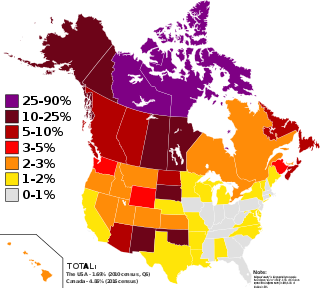
In Canada, Indigenous peoples comprise the First Nations, Inuit, and Métis. Although Indian is a term still commonly used in legal documents, the descriptors Indian and Eskimo have fallen into disuse in Canada, and many consider them to be pejorative. Aboriginal peoples as a collective noun is a specific term of art used in some legal documents, including the Constitution Act, 1982, though in most Indigenous circles Aboriginal has also fallen into disfavour.

Pond Inlet is a small, predominantly Inuit community in the Qikiqtaaluk Region of Nunavut, Canada, located on northern Baffin Island. To the Inuit the name of the place "is and always has been Mittimatalik." The Scottish explorer Sir John Ross had named an arm of the sea that separates Bylot Island from Baffin Island as Pond's Bay, and the hamlet now shares that name. On 29 August 1921, the Hudson's Bay Company opened its trading post near the Inuit camp and named it Pond Inlet, marking the expansion of its trading empire into the High Arctic.
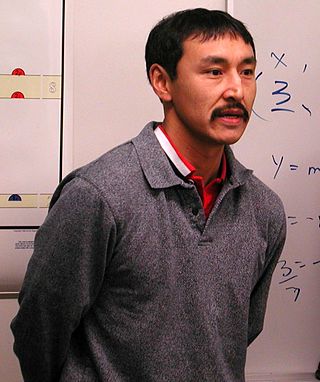
Paul Okalik is a Canadian politician. He is the first Inuk to have been called to the Nunavut Bar. He was also the first premier of Nunavut.
The minister of Crown–Indigenous relations is a minister of the Crown in the Canadian Cabinet, one of two ministers who administer Crown-Indigenous Relations and Northern Affairs Canada (CIRNAC), the department of the Government of Canada which is responsible for administering the Indian Act and other legislation dealing with "Indians and lands reserved for the Indians" under subsection 91(24) of the Constitution Act, 1867. The minister is also more broadly responsible for overall relations between the federal government and First Nations, Métis, and Inuit.

Thomas Rodney Berger was a Canadian politician and jurist. He was briefly a member of the House of Commons of Canada in the early 1960s, entering provincial politics thereafter. He led the British Columbia New Democratic Party for most of 1969, prior to Dave Barrett. Berger was a justice of the Supreme Court of British Columbia from 1971 to 1983. In 1974, Berger became the royal commissioner of the Mackenzie Valley Pipeline Inquiry, which released its findings in 1977. After retiring from the bench, Berger continued to practise law and served in various public capacities. He was a member of the Order of Canada and the Order of British Columbia.
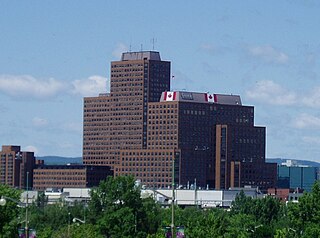
Crown–Indigenous Relations and Northern Affairs Canada is the department of the Government of Canada responsible for Canada's northern lands and territories, and one of two departments with responsibility for policies relating to Indigenous peoples in Canada.
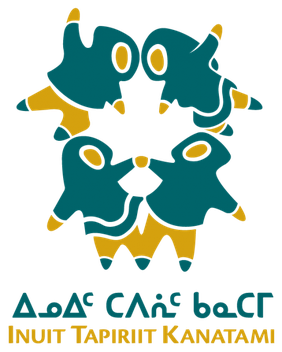
Inuit Tapiriit Kanatami, previously known as the Inuit Tapirisat of Canada, is a nonprofit organization in Canada that represents over 65,000 Inuit across Inuit Nunangat and the rest of Canada. Their mission is to "serve as a national voice protecting and advancing the rights and interests of Inuit in Canada."

Sheila Watt-Cloutier is a Canadian Inuk activist. She has been a political representative for Inuit at the regional, national and international levels, most recently as International Chair for the Inuit Circumpolar Council. Watt-Cloutier has worked on a range of social and environmental issues affecting Inuit, most recently, persistent organic pollutants and global warming. She has received numerous awards and honours for her work, and has been featured in a number of documentaries and profiled by journalists from all media. Watt-Cloutier sits as an adviser to Canada's Ecofiscal Commission. She is also a senior fellow at the Centre for International Governance Innovation.
Nunavut Tunngavik Incorporated is the legal representative of the Inuit of Nunavut for the purposes of native treaty rights and treaty negotiation. The presidents of NTI, Makivik Corporation, Nunatsiavut, and the Inuvialuit Regional Corporation, the four regional land claims organizations, govern the national body, the Inuit Tapiriit Kanatami (ITK) as its board of directors. NTI continues to play a central role in Nunavut, even after the creation of the Government of Nunavut. As the successor of the Tunngavik Federation of Nunavut, which was a signatory of the Nunavut Land Claims Agreement on behalf of Inuit, NTI is responsible for ensuring that the Nunavut Land Claims Agreement is implemented fully by the Government of Canada and the Government of Nunavut and that all parties fulfill their obligations.
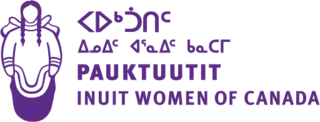
Pauktuutit is an organization in Canada that represents Inuit women. It was officially started in 1984 and is headquartered in Ottawa for easier access to the Parliament of Canada. Every Canadian Inuit woman is considered to be a member of Pauktuutit. Thus, no woman needs to pay for membership.

Canadian Aboriginal law is the body of law of Canada that concerns a variety of issues related to Indigenous peoples in Canada. Canadian Aboriginal Law is different from Canadian Indigenous law: In Canada, Indigenous Law refers to the legal traditions, customs, and practices of Indigenous peoples and groups. Aboriginal peoples as a collective noun is a specific term of art used in legal documents, including the Constitution Act, 1982, and includes First Nations, Inuit and Métis people. Canadian Aboriginal law provides certain constitutionally recognized rights to land and traditional practices. Canadian Aboriginal Law enforces and interprets certain treaties between the Crown and Indigenous people, and manages much of their interaction. A major area of Aboriginal law involves the duty to consult and accommodate.
The Inuit Broadcasting Corporation (IBC) is a television production company based in Nunavut with programming targeted at the Inuit population of Nunavut. Almost all of its programs are broadcast in Inuktitut. Some are also in English. IBC shows centre on Inuit culture. The company has five production centers in Nunavut, all staffed by Inuit. Founded in the early 1980s, the IBC was the first indigenous-language television network in North America.

Inuit are a group of culturally and historically similar Indigenous peoples traditionally inhabiting the Arctic and subarctic regions of North America, including Greenland, Labrador, Quebec, Nunavut, the Northwest Territories, Yukon (traditionally), Alaska, and Chukotsky District of Chukotka Autonomous Okrug, Russia. Inuit languages are part of the Eskimo–Aleut languages, also known as Inuit-Yupik-Unangan, and also as Eskaleut. Inuit Sign Language is a critically endangered language isolate used in Nunavut.

Inuit Nunangat refers to the land, water, and ice of the homeland of Inuit in Canada. This Arctic homeland consists of four northern Canadian regions called the Inuvialuit Settlement Region, the territory Nunavut (ᓄᓇᕗᑦ), Nunavik (ᓄᓇᕕᒃ) in northern Quebec, and Nunatsiavut of Newfoundland and Labrador.

According to the latest available data, Statistics Canada estimates 4,157 suicides took place in Canada in 2017, making it the 9th leading cause of death, between Alzheimer's disease (8th) and cirrhosis and other liver diseases (10th). In 2009, there were an estimated 3,890 suicide deaths.
Indigenous or Aboriginal self-government refers to proposals to give governments representing the Indigenous peoples in Canada greater powers of government. These proposals range from giving Aboriginal governments powers similar to that of local governments in Canada to demands that Indigenous governments be recognized as sovereign, and capable of "nation-to-nation" negotiations as legal equals to the Crown, as well as many other variations.
Aluki Kotierk is an Inuk politician. She was born in Iqaluit, Nunavut, but grew up in Igloolik.
Kelly Fraser was a Canadian Inuk pop singer and songwriter, whose second album, Sedna, received a Juno Award nomination for Indigenous Music Album of the Year at the Juno Awards of 2018.

Simonie Michael was a Canadian politician from the eastern Northwest Territories who was the first Inuk elected to a legislature in Canada. Before becoming involved in politics, Michael worked as a carpenter and business owner, and was one of very few translators between Inuktitut and English. He became a prominent member of the Inuit co-operative housing movement and a community activist in Iqaluit, and was appointed to a series of governing bodies, including the precursor to the Iqaluit City Council.
Colleen Aasiva Nakashuk, better known by her stage name Aasiva, is an Inuit Canadian singer and songwriter. Her style of indie folk music features the ukulele, Inuktitut lyrics, and Inuit throat singing.
References
- ↑ "Murray Angus". Carleton University. Retrieved 15 February 2020.
- ↑ Angus, Murray; Hanson, Morley (2011). "The New "Three R's"" (PDF). Canadian Centre for Policy Alternatives. Retrieved 15 February 2020.
- ↑ Sponagle, Jane (25 April 2016). "After 31 years, Nunavut Sivuniksavut founder and teacher says goodbye". CBC. Retrieved 15 February 2020.
- ↑ "About us". Nunavut Sivuniksavut. Retrieved 15 February 2020.
- ↑ Murray, Angus (1991). And the Last Shall Be First: Native Policy in an Era of Cutbacks. Toronto: NC Press. ISBN 1550210645..
- 1 2 3 4 "Mr. Murray Angus". Office of the Governor General of Canada. 2014. Retrieved 15 February 2020.